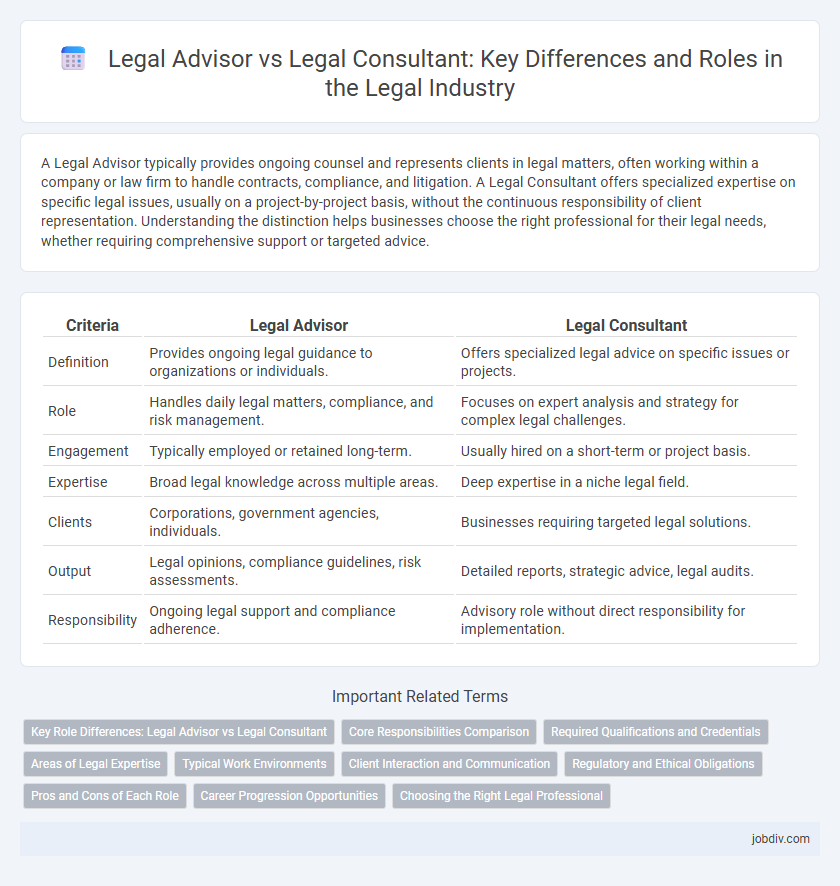A Legal Advisor typically provides ongoing counsel and represents clients in legal matters, often working within a company or law firm to handle contracts, compliance, and litigation. A Legal Consultant offers specialized expertise on specific legal issues, usually on a project-by-project basis, without the continuous responsibility of client representation. Understanding the distinction helps businesses choose the right professional for their legal needs, whether requiring comprehensive support or targeted advice.
Table of Comparison
| Criteria | Legal Advisor | Legal Consultant |
|---|---|---|
| Definition | Provides ongoing legal guidance to organizations or individuals. | Offers specialized legal advice on specific issues or projects. |
| Role | Handles daily legal matters, compliance, and risk management. | Focuses on expert analysis and strategy for complex legal challenges. |
| Engagement | Typically employed or retained long-term. | Usually hired on a short-term or project basis. |
| Expertise | Broad legal knowledge across multiple areas. | Deep expertise in a niche legal field. |
| Clients | Corporations, government agencies, individuals. | Businesses requiring targeted legal solutions. |
| Output | Legal opinions, compliance guidelines, risk assessments. | Detailed reports, strategic advice, legal audits. |
| Responsibility | Ongoing legal support and compliance adherence. | Advisory role without direct responsibility for implementation. |
Key Role Differences: Legal Advisor vs Legal Consultant
Legal Advisors primarily provide ongoing legal guidance and risk management to corporations, ensuring compliance with laws and internal policies. Legal Consultants offer specialized advice on specific legal projects or disputes, often on a temporary or case-by-case basis. The main distinction lies in the Legal Advisor's continuous role versus the Legal Consultant's focused, short-term expertise.
Core Responsibilities Comparison
Legal Advisors primarily provide counsel on compliance, risk management, and regulatory issues to ensure organizations adhere to laws and policies. Legal Consultants focus on offering expert opinions, drafting contracts, and assisting in litigation strategies to support business decisions and dispute resolutions. Both roles require deep legal knowledge, but Legal Advisors are more embedded within organizations, while Legal Consultants operate externally on a project basis.
Required Qualifications and Credentials
A Legal Advisor typically requires a law degree (LLB or JD) and must be licensed to practice law in their jurisdiction, often holding memberships in relevant bar associations. In contrast, a Legal Consultant may have specialized legal knowledge or experience without the necessity of bar admission, focusing on providing expert legal opinions in specific industries. Both roles demand strong analytical skills and a thorough understanding of legal principles, but credentialing formalities differ significantly, with Legal Advisors bound by stricter regulatory standards.
Areas of Legal Expertise
Legal Advisors typically provide ongoing guidance in corporate law, compliance, contract negotiation, and regulatory matters tailored to businesses or organizations. Legal Consultants often specialize in niche legal areas such as intellectual property, environmental law, or dispute resolution, offering expert advice on complex or specific legal issues. Both roles require deep legal knowledge but differ in scope and client engagement, impacting their areas of legal expertise and application.
Typical Work Environments
Legal advisors typically work within corporate legal departments, government agencies, or law firms, providing ongoing legal support and compliance guidance tailored to organizational needs. Legal consultants often operate in advisory roles across multiple industries, including healthcare, finance, and technology, offering specialized expertise on specific projects or regulatory issues. Both roles demand a deep understanding of legal frameworks but differ in the scope and continuity of their work environments.
Client Interaction and Communication
Legal Advisors typically engage in direct, ongoing communication with clients to understand their unique legal needs and provide tailored advice, ensuring continuous support throughout the decision-making process. Legal Consultants often interact with clients on a project basis, delivering specialized expertise and recommendations without maintaining long-term client relationships. Effective client interaction for Legal Advisors emphasizes personalized guidance, while Legal Consultants prioritize clear, concise communication of complex legal issues within specific engagements.
Regulatory and Ethical Obligations
Legal Advisors ensure compliance with regulatory frameworks while upholding stringent ethical standards to provide authoritative guidance on legal matters. Legal Consultants offer specialized expertise to help organizations navigate regulatory requirements but may not bear the same level of fiduciary responsibility or ethical accountability as Legal Advisors. Understanding the distinctions in regulatory and ethical obligations is crucial for selecting the appropriate legal professional for corporate governance and risk management.
Pros and Cons of Each Role
Legal advisors offer ongoing, in-depth counsel within an organization, ensuring compliance and risk management but may be limited in scope to the company's specific legal needs. Legal consultants provide specialized expertise on particular issues or projects, delivering flexible and objective advice, though they may lack continuous engagement and comprehensive understanding of the client's business. Choosing between the two depends on whether an entity requires sustained legal oversight or targeted, expert input for discrete matters.
Career Progression Opportunities
Legal advisors often have broader career progression opportunities within corporate legal departments or government agencies due to their comprehensive role in providing ongoing legal oversight and compliance management. Legal consultants typically advance by specializing in niche areas of law, offering expert advice on complex issues to multiple clients, which can lead to high-demand consultancy roles or transitions into senior advisory positions. Both career paths benefit from continuous professional development, but legal advisors may access leadership roles more readily, while consultants often pursue expertise-driven career growth.
Choosing the Right Legal Professional
Choosing the right legal professional depends on the specific needs of your case; a Legal Advisor typically provides ongoing legal guidance within organizations, while a Legal Consultant offers specialized, project-based expertise. Legal Advisors often handle compliance, risk management, and regulatory issues as part of their continuous role, whereas Legal Consultants are hired for their expert analysis and recommendations on complex legal matters or transactions. Understanding the scope, duration, and nature of legal services required is crucial for selecting between a Legal Advisor and a Legal Consultant.
Legal Advisor vs Legal Consultant Infographic

 jobdiv.com
jobdiv.com